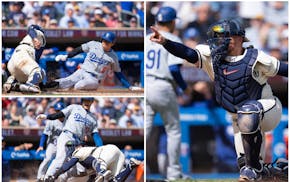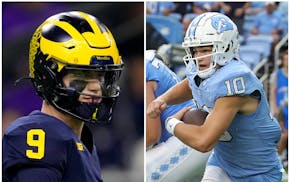SOCHI, RUSSIA – Ryan Kesler saw Ilya Kovalchuk load up for a slapshot and instinctively threw his body into the shooting lane, unafraid of being drilled by a fast-moving puck. That's what hockey players do.
Kovalchuk's rocket nailed Kesler in the hand, sending him off the ice wincing in pain during Saturday's thriller against Russia. Team USA had some anxious moments as doctors examined Kesler's hand, but luckily, Kesler avoided serious injury and returned a few minutes later.
If Team USA breathed a sigh of relief, imagine the reaction 12 hours away in Vancouver, home of the NHL's Canucks, the team that pays Kesler's salary. Think they embraced the Olympic spirit at that precise moment?
That exact scenario is why the NHL likely will stop allowing its players to compete in the Olympics after these Games.
And that's a shame.
Anyone who witnessed the passion and intensity and emotion on display in that wonderful U.S.-Russia game should understand the importance of having the best players in the world take part in this event.
The NHL hasn't announced whether it will send its players to the 2018 Games in South Korea, but hockey insiders think the league will ultimately vote no. Star Tribune hockey writer Michael Russo reported recently that the Wild was one of the teams that voted against sending players to these Olympics. NHL Deputy Commissioner Bill Daly said he expects a decision within six months after the league discusses all factors.
"There are a lot of negatives that come along with the Olympics," he said. "The fact is we are guests here, and it is not our tournament and it is someone else's tournament. In terms of making it as good as it can be, we do not have control over that. There are positives and negatives."
The negatives are obvious and understandable. The Olympics disrupt the NHL season and force teams to cram games into a condensed schedule. More important, players are exposed to potential injuries that could have a dramatic effect once the NHL resumes games.
Any team and fan base would feel justifiably angry and sick if one of their stars suffered a season-ending injury in the Olympics. NHL owners have millions of dollars invested in these players.
There's no disputing those legitimate concerns. Yet the NHL assuredly benefits from the exposure that the Olympics provide to a broader audience that might not otherwise care about its product.
NBC generated record ratings for the U.S.-Russia epic that ended in the eighth shootout round. It's safe to assume that not all of those viewers were hockey fans. Maybe they converted some people who might now give the sport a chance.
Oshie is Olympic Twitter star
Warroad's T.J. Oshie, the star of that game, added more than 125,000 new twitter followers in 24 hours. President Obama sent him a congratulatory tweet. People are still talking about the electric atmosphere inside that arena.
And this is bad for the NHL?
Hockey fans are incredibly loyal and passionate, but they're also outnumbered significantly compared to the other major sports. The Olympics provide the NHL a big stage to showcase its sport and give new viewers a glimpse of its high-end talent. This opportunity allows the league to put its best foot forward as countries assemble all-star rosters. It's a pretty game, too. High skill, crisp passing, none of those ridiculous staged fights at the opening faceoff.
NHL officials would love to revive the World Cup of Hockey in place of Olympic participation. In that scenario, they could host the international event in the summer so that the schedule isn't affected and the impact of injuries could be mitigated and, above all, it would fall under the NHL's umbrella and generate money for the league. The NHL would be able to control that tournament in conjunction with its players union.
But even Daly admitted that NHL players love this event and that a World Cup doesn't carry the same international pizazz.
"We certainly think the key element that makes the Olympics successful is best-on-best competition," he said. "Having said that, I have heard the players feel the Olympics are something special. So there is an added element that the Olympics bring what is impossible for us to recreate."
That element was on full display as Team USA and Russia battled into overtime and then eight shootout rounds. That was hockey at its finest on a big stage.
"I'm a believer that you should have the best players playing in the Olympics," Team USA captain Zach Parise said. "We've played in some pretty exciting games. Hopefully we'll continue to be a part of it."
Same here, but the growing sense is that this will be the final Olympics for NHL players. We should enjoy this while it lasts.

Scoggins: Finch feeling heat of the Suns as playoff battle looms
Scoggins: Why 'championship or bust' fits these Wolves

Scoggins: Anatomy of a game-saving play as Correa throws out Ohtani


